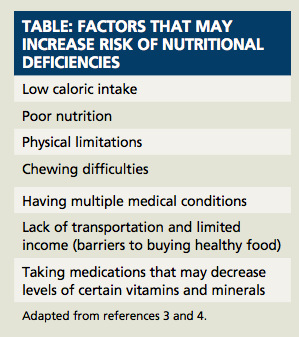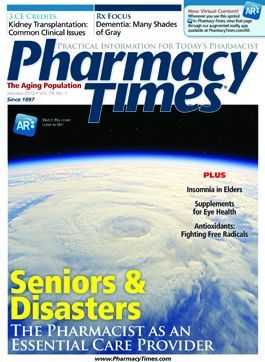Publication
Article
Pharmacy Times
OTC Multivitamins for Middle Age and Beyond
Author(s):
The nutritional deficits of aging patients can be addressed with OTC supplements.
The nutritional deficits of aging patients can be addressed with OTC supplements.
According to the Centers for Disease Control and Prevention, approximately 76% of patients 60 years and older take at least 2 prescription drugs, and 37% take at least 5 prescription drugs.1 In addition, nutritional supplements such as multivitamins are among the OTC products most commonly used by elderly patients.2
Because patients are more likely to take prescription medications as they age, pharmacists are in a pivotal position to help interested patients select from the range of available multivitamin/multimineral supplements, as well as to ascertain the appropriateness of their use and screen for potential drug—micronutrient interactions. In addition, because the use of some medications is associated with decreased appetite, pharmacists may advise some elderly patients to take a nutritional supplement to guard against nutritional shortfalls. The Table3,4 lists some common risk factors for nutritional deficits.
The Benefits of Supplementation
More than half of the American population take some type of nutritional supplement, and the most commonly used supplements are multivitamin/multimineral supplements.4 Results from a recent large randomized trial that was part of the Physicians’ Health Study II, a nationwide study investigating the effect of taking OTC drugs including aspirin and supplements on the risk of cancer, cardiovascular disease (CVD), and age-related eye diseases, were presented at the American Association for Cancer Research Conference in October 2012.
These results indicated that daily use of a multivitamin supplement may moderately decrease the total risk of cancer in men.5,6 The results also showed that after 11 years of multivitamin use, total cancer occurrence was reduced by approximately 8%.5,6 Although the researchers found no effect of multivitamin use on prostate cancer, they found indications that multivitamin use may offer some benefit in preventing or decreasing the rate of other cancers in men 50 years and older.5,6 Results from another part of the study recently published in the Journal of the American Medical Association, however, reported that daily multivitamin use does not appear to prevent or reduce the frequency of CVD or stroke, CVD death, total mortality, or heart attacks among middle-aged men.7,8

A variety of multivitamin/multimineral supplements are specially formulated to meet the nutritional needs of older patients. These supplements contain nutrients to increase energy and to maintain the health of the bones, heart, colon, eyes, and immune system. Supplements formulated for patients 50 years and older typically include elevated quantities of vitamins B
1
, B
2
, B
6
, B
12
, C, D, and E and folic acid, but include no iron, because individuals in this patient population require less iron and generally meet their needs through diet alone.
4,9-12
A number of clinical studies have indicated that high iron stores may contribute to conditions such as cancer and CVD, but research on this matter has been inconclusive so far.
9-12
Some formulations also contain ginkgo biloba to promote improved memory and concentration.
9-12
Gender-specific formulations are also available that are tailored to meet the nutritional needs of men and women in this age group. Formulations designed for women may also contain nutrients to promote breast, bone, and skin health. There are also products designed specifically for women going through menopause. Formulations for men contain key nutrients to maintain energy and promote prostate and heart health.
Counseling Points
Patients opting to use nutritional supplements should be reminded of the importance of adhering to a balanced and nutritious diet. During counseling, they should be reminded that these supplements are intended to prevent nutritional deficiencies and to maintain nutritional stores and are not intended for the self-treatment of vitamin deficiencies.3
Prior to recommending any multivitamin/multimineral supplement to a patient—especially an older patient—pharmacists should assess the patient’s medical and medication history and advise the patient regarding possible drug—micronutrient interactions or contraindications.
Pharmacists should also check for therapeutic duplications in case the patient is taking any other nutritional supplements. Patients should always be reminded to discuss any concerns with their primary health care provider.
Ms. Terrie is a clinical pharmacy writer based in Haymarket, Virginia.
References
- Prescription drug use continues to increase: U.S. prescription drug data for 2007-2008. Centers for Disease Control and Prevention website. www.cdc.gov/nchs/data/databriefs/db42.htm. Accessed December 4, 2012.
- Davidow L. Self care and nonprescription pharmacotherapy. In Berardi R, Newton G, McDermott JH, et al, eds. Handbook of Nonprescription Drugs. 16th ed. Washington, DC: American Pharmacists Association; 2009.
- Nutrition for older persons. World Health Organization website. www.who.int/nutrition/topics/ageing/en/index1.html. Accessed December 5, 2012.
- Huckleberry Y, Rollins C. Essential and conditionally essential nutrients. In Krinsky D, Berardi R, Ferreri S, et al, eds. Handbook of Nonprescription Drugs. 17th ed. Washington, DC: American Pharmacists Association; 2012.
- Multivitamins may lower cancer risk in men. Medscape website. www.medscape.com/viewarticle/772811. Accessed December 5, 2012.
- Gaziano JM, Sesso HD, Christen WG, et al. Multivitamins in the prevention of cancer in men: the Physicians’ Health Study II randomized controlled trial. JAMA. 2012;308(18):1871-1880.
- Multivitamins do not prevent heart disease. Medline Plus website. www.nlm.nih.gov/medlineplus/podcast/transcript120312.html. Accessed December 5, 2012.
- Sesso HD, Christen WG, Bubes V, et al. Multivitamins in the prevention of cardiovascular disease in men: the Physicians’ Health Study II randomized controlled trial. JAMA. 2012;308(17):1751-1760.
- One A Day vitamins [product information]. Bayer Consumer website. www.oneaday.com. Accessed December 5, 2012.
- Centrum Silver [product information]. Wyeth Consumer Health website. www.centrum.com. Accessed December 5, 2012.
- Nature Made vitamins [product information]. Pharmavite LLC website. www.naturemade.com. Accessed December 9, 2012.
- Alive multivitamins. Nature’s Way website. www.feelalive.com. Accessed December 9, 2012.
- Drug nutrient depletions/interactions chart. PhytoPharmica Natural Medicines website. www.pharmacistelink.com/naturalmedicine/pdfs/P4880x1204DrugChart.pdf. Accessed December 9, 2012.
- Drug influences on nutrient levels and depletion. Natural Medicines Comprehensive Database website. http://naturaldatabase.therapeuticresearch.com/ce/ceCourse.aspx?s=ND&pc=08-40&cec=0&pm=5. Accessed December 9, 2012.

Newsletter
Stay informed on drug updates, treatment guidelines, and pharmacy practice trends—subscribe to Pharmacy Times for weekly clinical insights.






